Introduction
With the convention season ramping up, many gamers will be heading to the great gatherings around the world to spend their time playing role playing games with complete strangers. But, none of this would be possible without the work of Game Masters (GMs) months in advance. GMs are somewhat of a rare breed amongst RPG players due to the “homework” the role requires. But Convention GMs are an even more unique group as they may not have a familiar group of players. In fact, more than likely, every game they run over a weekend will be with a different group of players each time.
So, why do it? What is the appeal? I interviewed a couple of seasoned Con GMs and added some of my own experience to provide some insight into Con GMing and also provide some tips for first-timers as well as veterans to make your game top notch.
Why You Should GM at a Convention
The Comfort Zone
First off, if you typically take on the role of GM in your home group, you may feel more comfortable GMing at a convention. This is true for me. I have been GMing for so long, that it feels weird to be just playing sometimes. That being said, I do usually play a game or two but GMing just feels more natural at this point.
The People
Once you’re comfortable, you’ll meet new people. Matt Rauscher of The Pickled Dragon adds, “Some of the people I talk to
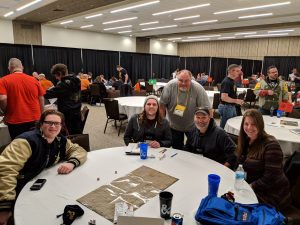
most frequently I met at a convention while running a game. As the DM, you get to interact more directly with the people at your table and plant that seed of potential friendship.”
Kelsey Dionne of The Arcane Library says, “I GM at conventions because it’s a great way to meet new gamers, demonstrate my ‘style’ of game mastering, and hopefully bring some people together for a memorable and exciting experience.” If everyone’s comfortable and friendly the game will be rewarding.
The Creative Process
Next, is that it is a great creative outlet. Matt says, “I spend most of my free time writing and have created more adventures than I could possibly ever run. Conventions give me a chance to try a few of these with new people.” Use con games as your test bed. Kelsey says, “You want to put forth the bits and bobs from your writing or favorite adventure that shine the most.” Play through a new adventure, get feedback, and then tweak it. You could even bring your con game back again next year more polished, and ready to try out on a whole new set of people.
The Perks
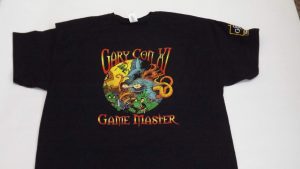
Lastly, conventions always need GMs to make sure attendees have something to do. If you have the skills, you can volunteer your time to help your fellow con-goers have a great time.
On top of this, because conventions do need GMs, sometimes they offer perks! Perks vary from con to con and usually increase with the number of hours you volunteer. Some examples include free snacks, free drinks (water, soda, and sometimes even beer!), exclusive merch, and discounts to next year’s con. My favorite GM perks is the GM Tableside Service. Con staffers will bring you complimentary snacks and drinks at your game table, so you don’t have to get up! It’s wonderful to get a bottle of water halfway through a game to refresh that dry throat from talking.
Beginner Tips for First Time Convention GMs
Know Thyself
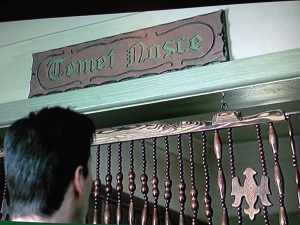
If it’s your first time, you’ll want to be as comfortable with the material as possible. If you primarily GM Dungeons &
Dragons, 5th Edition don’t feel like you have to run 2nd Edition. The same goes for what type of adventure/scenario to run. If you are more comfortable sticking to a prewritten module, go with that. If you are more comfortable with your homebrew setting, then use it. Just be sure you’re prepared for either of those, which brings us to…
Be prepared!
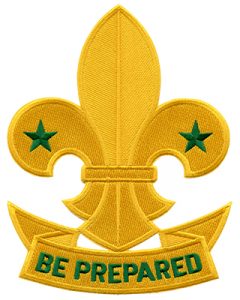
The more preparation you have done ahead of time, the better. If you’re using a prewritten scenario, read (or even better play!) through it several times until you know it forwards and backwards. If you write your own, make sure you do the same to check for game balance and missing parts.
Beyond that though, make sure you are prepared for as many possibilities as you can. Have pre-generated characters in case
the players don’t bring any. In fact, Dionne says, “come with TONS of pre-made characters.” It never hurts to have variety for your players. Have extra dice and pencils, players tend to forget to bring those even though they’re at a gaming convention.
Also, Internet accessibility is not always guaranteed, especially at large cons. The same goes for power outlet access. If there are any handouts or custom rules that the players will need, print them out. If possible, print them at home and bring them with you. That printer in the GMs’ Lounge might not work!
Speak up!

“Conventions can be really loud and one of the biggest complaints I hear from players is when they can’t hear the GM,” says Rauscher. Don’t feel like you have to scream and yell (unless it’s appropriate to the story!) but practice your voice projection.
One easy way to project your voice is to stand (if you are able) and be animated. Use your whole body to speak and your voice will follow. Jim McCarthy, a voiceover professional, has a great short video where he explains how standing helps. Standing allows you to speak from your diaphragm which naturally amplifies your voice. There are lots of other great videos on Youtube about this subject and public speaking in general. Take the time to watch a few and practice your public speaking voice. That being said, standing through a four hour game may be tough. Try starting with standing just during combat scenes where you need to be able to speak over everyone strategizing. This commanding body language also has the side effect of appearing engaged and focused.
Advanced Tips for Veteran Convention GMs
Manage Your Time

Con games run on a set schedule and most of the time players have somewhere to be after your game. Your game should stay well within the start and stop time to allow for setup, wrap-up, and travel between tables. A rough rule of thumb should be 30 minutes before and after. So, for example, if your game is a two-hour game then you should schedule for a 3-hour slot.
Also, make sure your game fits in the time you scheduled. Nothing’s worse than everyone having to pack up in the middle of the final battle because you ran out of time and the next group is standing around waiting for you to move. Your scenario should be very modular so that it can expand and contract as needed. Have optional sections that can be added or removed depending on how your time is going. I have also found 15-minute increments to be really useful for planning a game. So, for that two-hour game:
o Introduction – 15 minutes
o Encounter 1 – 30 minutes
o Encounter 2 – 30 minutes
o Optional Encounter – 15 minutes
o Final Encounter – 45 minutes
o Conclusion – 15 minutes
You can always adjust as needed, but this gives you a rough framework to keep an eye on. Speaking of adjustments, Kelsey Dionne says “don’t be afraid to simplify the character rules a bit if it will speed play — you will only have each group of people for a handful of hours, so might as well keep it as streamlined as possible.”
Managing your time well also gives you a chance to socialize with your players, which you will see in a moment can make for a better game.
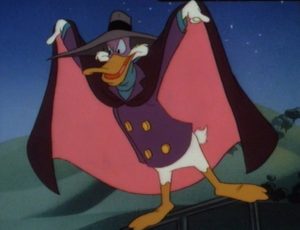
Get Dangerous!
Kelsey gives a fantastic bit of advice for making memorable encounters: “The great thing about a con game is that it’s short, so you can ratchet up the intensity. I tend to make a couple very difficult and dynamic combat encounters and introduce one or two highly entertaining NPCs.” This isn’t a long-term campaign, characters can die with less consequences. I once got “wood-chippered” by a Blade Barrier in a con game. I had so much fun even though my character died.
Engage.

Above all else, engage your players. We talked about projecting your voice and being animated. Tell your story, don’t read it. If you are into your story, your players will come along. Matt has this important thought: “Whether you are the GM or [a] player, you should look to lift up everyone at your table. If you notice someone is a bit [shyer] or not able to get a word in, give them the floor on occasion.” This is so important. Look for opportunities for everyone to shine. Everyone should feel like they are contributing to the shared story.
Another way you can engage your players is to socialize with them. “I suggest showing up early to your table, greet each player as they arrive and try to engage in small talk. You will find that being warm and inviting will not only loosen up your players but also chase away any butterflies you may have,” says Matt. We all do this with our home games. There’s always that time at the beginning of a game where everyone is getting settled and chatting. This is where the foundations of bonds are made and then solidified later in the game. Make sure you account for that time and join in the conversation and get to know your players.
The Wrap-Up
This is by no means a complete list of tips and tricks. There are many, many more but these are the ones that came up from our experiences. What are yours? Leave some comments below and let us know your favorite dos and don’ts for GMing at conventions. Also, tell us why you GM at conventions or why you want to start!
Special thanks to our guest GMs for their insights! Follow both of these fantastic creators on social media for more original content, musings, and insights.
![]() Kelsey Dionne is a bestselling writer of Dungeons & Dragons 5th Edition content. Her work can be found at The Arcane Library.
Kelsey Dionne is a bestselling writer of Dungeons & Dragons 5th Edition content. Her work can be found at The Arcane Library.
![]() Matt Rauscher is a bestselling writer of Dungeons & Dragons 5th Edition content as well. His work can be found at The Pickled Dragon.
Matt Rauscher is a bestselling writer of Dungeons & Dragons 5th Edition content as well. His work can be found at The Pickled Dragon.


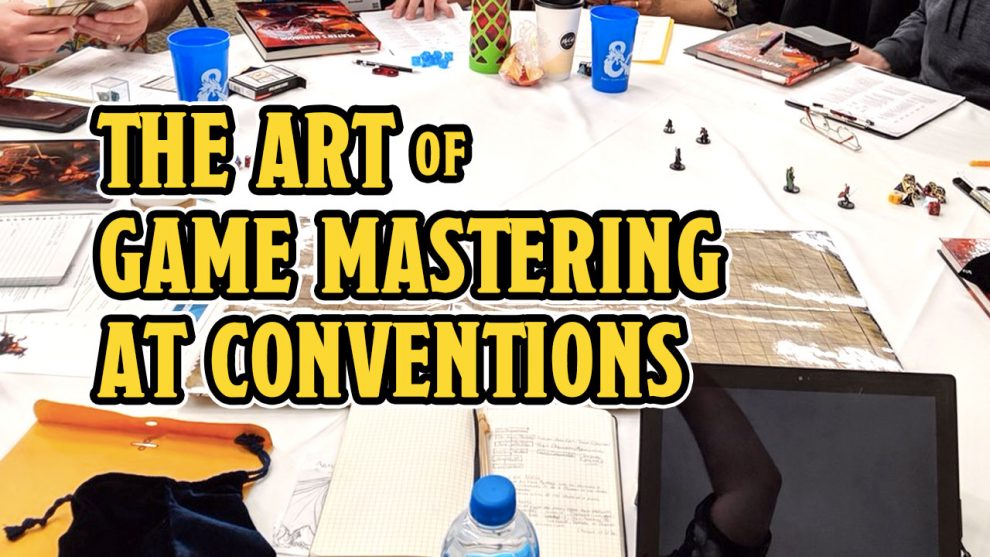
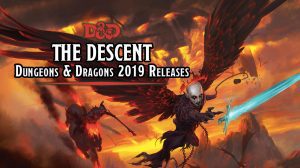

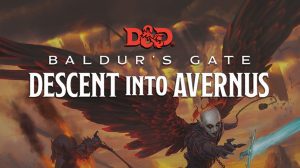





Add Comment